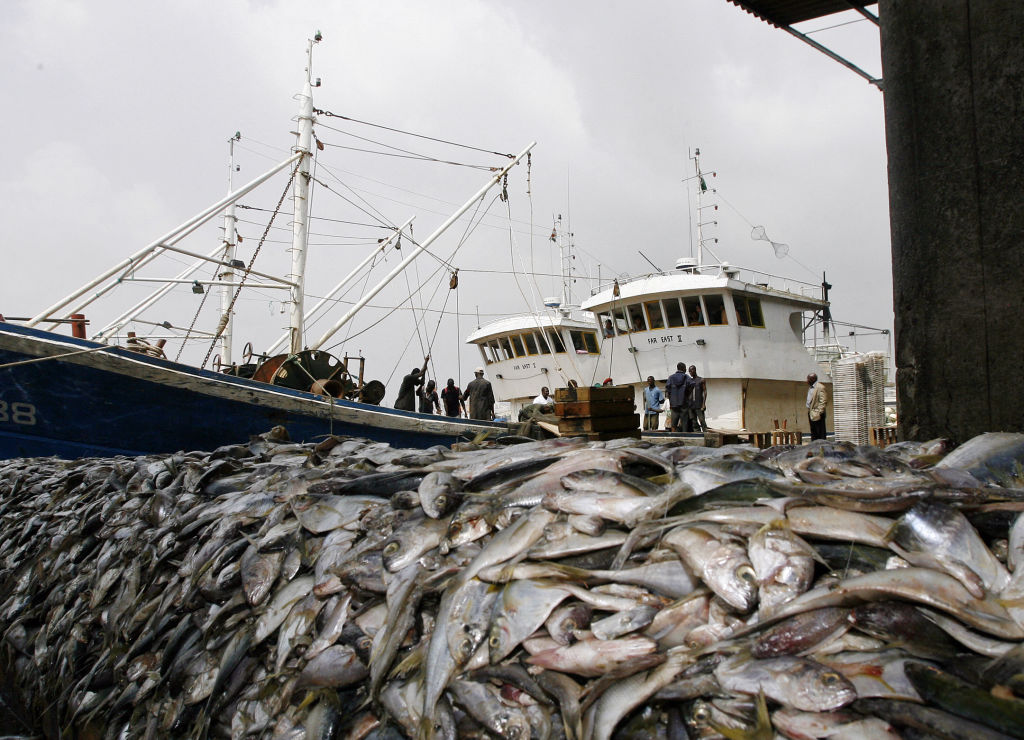Gabon has signed a memorandum of understanding with Global Fishing Watch, a nonprofit organization, that aims to enhance the West African country’s ability to monitor, control and surveil its waters by leveraging satellite technology and data analytics.
This will support Gabon’s efforts to combat illegal, unreported and unregulated fishing, particularly in the country’s exclusive economic zone, where intrusions by foreign vessels have been a challenge for decades. Gabon signed the memorandum and an agreement with Global Fishing Watch partner Trygg Mat Tracking on June 25.
“Gabon has chosen transparency, control and compliance with international standards,” Laurence Mengue-Me-Nzoghe Ndong, Gabon’s minister of the sea, fisheries and blue economy, said in a report by Hook and Net Magazine.
The deals will provide technical cooperation on Gabon’s initiative to equip its artisanal fishing fleet — about 1,000 canoes — with tracking devices. More than 300 units have been installed. Data captured through the initiative is expected to help develop Gabonese fisheries policies and regulations concerning industrial and small-scale fisheries management.
The partnership also is expected to strengthen Gabon’s efforts to expand the use of Automatic Identifications Systems (AIS) by vessels operating in the country’s economic zone. AIS helps identify and track ships, assist in search and rescue operations, simplify information exchange and improve maritime domain awareness.
“By formalizing this agreement, Gabon is reinforcing its leadership in regional fisheries transparency and ocean governance,”
Dame Mboup, Global Fishing Watch’s manager for Africa
, said in a news release. “This partnership enables smarter, more effective management of Gabon’s marine resources, benefiting both local communities and the broader West African ecosystem.”
“Together, we’re working to put data at the heart of decision-making for healthier oceans,” Mboup added. “With transparency as the foundation, Gabon is setting a standard for others to follow.”
Continental Collaboration
Global Fishing Watch and Trygg have collaborated with coastal African countries for years to combat illegal fishing. In 2021, they partnered with Côte d’Ivoire, Ghana, Kenya, Senegal and the Fisheries Committee for the West Central Gulf of Guinea on a project to provide authorities with satellite tracking data, analysis and training to assess fishing vessels’ recent operations and compliance risk.
This collaboration helps port authorities and fisheries officials monitor the movements of fishing and carrier vessels, identify illegal activity, and target inspections and enforcement where they are needed most.
“Implementing strong port controls is the best and most effective opportunity to ensure that illegal catch has no market, and illegal fishing operators are cut off from their profits,” Duncan Copeland, former Trygg executive director, said in a news release at the time. “To do so requires the ability to make rapid risk assessments to inform the key decisions on whether to let a vessel into port, and where to target inspections.”
Global Fishing Watch, the International Monitoring, Control and Surveillance Network and Trygg in 2022 created the Joint Analytical Cell, an initiative that aims to provide authorities with fisheries intelligence, analysis and capacity building to combat illegal fishing.
Bad Actors from Beijing
Gabon and other coastal West African nations have for decades been victimized by industrial fishing trawlers, particularly from China, which engage in a variety of illegal fishing activities. China is the world’s worst illegal fishing offender, according to the IUU Fishing Risk Index. Of the top 10 companies engaged in illegal fishing globally, eight are from China.
Throughout West Africa, Chinese bottom trawlers catch an estimated 2.35 million tons of fish per year, accounting for 50% of China’s total distant water catch and worth about $5 billion, the Environmental Justice Foundation reported. Bottom trawling involves dragging a huge net along the ocean floor, indiscriminately scooping up all manner of marine life. The practice kills juvenile fish, leading to declining fish stocks, and destroys ecosystems critical to the survival of marine life.
The illegal activities by trawlers from China and other foreign countries costs West Africa up to an estimated $10 billion per year, according to a September 2023 report by the Stimson Center, while the Financial Transparency Coalition found that the region attracts 40% of the world’s illegal trawlers.
China also has a well-documented practice of using its fishing fleet as a maritime militia in East and West Africa. Its vessels double as military auxiliaries trained by the People’s Liberation Army Navy. According to Carnegie Endowment for International Peace researchers, they are equipped with sophisticated surveillance equipment like subsea lasers and cameras, and some also carrying military grade equipment. The vessels operate under military command and are tasked with gathering data that can support the operations of underwater military assets.

